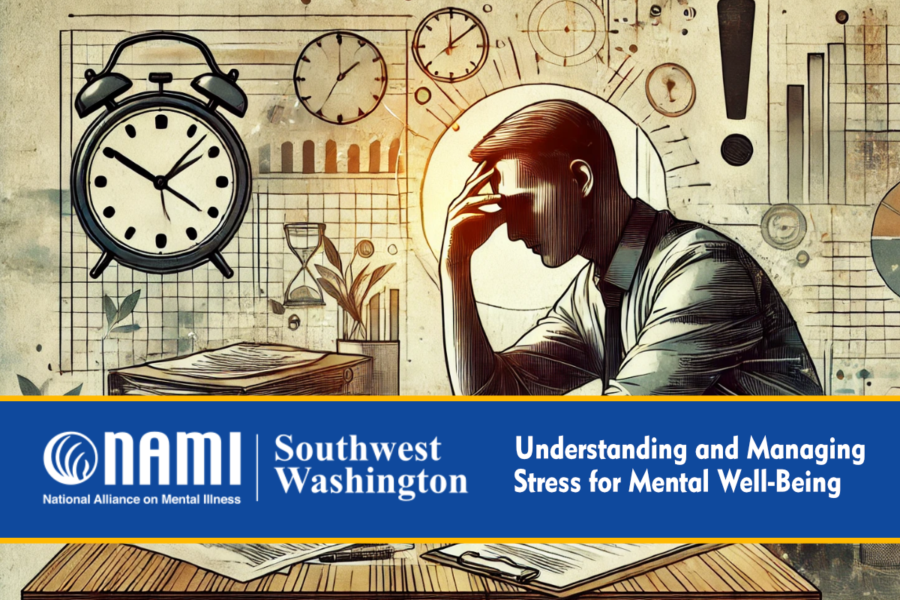By NAMI Southwest Washington
As International Stress Awareness Week unfolds from November 4-8, we at NAMI Southwest Washington are dedicated to shedding light on stress, its profound effects, and ways to build resilience in managing it. Stress is an inescapable part of life, arising from various challenges and pressures, whether from work, relationships, or personal struggles. While a certain level of stress can be motivating and even beneficial, chronic or unmanaged stress can take a toll on both our mental and physical well-being, leading to issues like anxiety, depression, high blood pressure, and other health concerns. Understanding how stress impacts us can empower us to respond in healthier ways.
Throughout this week, we’ll explore the underlying causes of stress and how it affects not only our bodies but also our productivity, relationships, and overall quality of life. We’ll discuss simple, evidence-based techniques—such as mindfulness, exercise, and effective time management—that can help us keep stress within healthy limits. Together, let’s learn practical tools for cultivating a balanced, healthier approach to life’s demands, reminding ourselves that help, and support are available and that taking proactive steps can make all the difference.
What Is Stress?
At its core, stress is a natural response that occurs when we perceive a challenge, threat, or demand that requires us to act. This response can be beneficial in the short term, triggering the body to release adrenaline and cortisol, known as the “stress hormones.” These hormones prepare us for “fight or flight,” heightening our alertness and providing energy to respond to the situation.
However, when stress becomes chronic—whether due to work pressures, personal challenges, or health concerns—our bodies remain in a prolonged state of alert. This long-term activation can strain multiple systems, taking a toll on both mental and physical health.
Chronic stress impacts nearly every system in the body, including:
Cardiovascular System: When we’re stressed, our body enters “fight or flight” mode, causing our heart rate to increase and blood vessels to constrict to quickly supply blood to our muscles and organs. While this response is helpful in short bursts, chronic stress forces the heart to work overtime, keeping blood pressure consistently elevated. Over time, high blood pressure, or hypertension, damages the blood vessels, increasing the risk of plaque buildup. This combination can lead to serious cardiovascular issues, such as coronary artery disease, heart attacks, and stroke. People with prolonged stress may also experience irregular heartbeats and a higher likelihood of lifestyle habits (like smoking or poor diet) that contribute to heart disease.
Immune System: The immune system is highly responsive to stress. In the short term, stress hormones can suppress inflammation and enhance immunity. However, chronic stress has the opposite effect. Cortisol, one of the primary stress hormones, eventually suppresses immune function, making it harder for the body to fend off infections. Prolonged stress can reduce the production of white blood cells, which are essential for fighting infections, leaving us more vulnerable to illnesses like colds, flu, and other infections. This weakening effect can also lead to slower recovery from injuries or illnesses and even contribute to chronic inflammatory conditions such as arthritis.
Digestive System: Stress and digestion are intricately linked due to the connection between the gut and brain, known as the gut-brain axis. When we’re stressed, blood flow and energy are redirected from the digestive system to other parts of the body, slowing down digestion. This can result in various digestive issues, from temporary symptoms like stomach aches, nausea, and bloating to chronic conditions such as acid reflux and irritable bowel syndrome (IBS). For some, stress may speed up digestion, causing diarrhea, while for others, it may slow down the digestive process, leading to constipation. Stress-induced changes in the digestive system can also disrupt the balance of gut bacteria, further affecting digestion and even mood.
Nervous System: The nervous system controls our body’s automatic responses, such as heart rate and muscle tension. Chronic stress keeps the sympathetic nervous system in a heightened state of activation, which over time can lead to an array of symptoms. Headaches, often stemming from muscle tension in the neck, shoulders, and scalp, are common. Persistent stress may also cause sleep disturbances, as it becomes difficult for the brain to switch from alertness to rest, impacting the quality of sleep. Muscle tension, another result of the body preparing to “fight or flee,” can lead to neck, back, and shoulder pain, making physical discomfort another chronic issue caused by stress.
Mental Health: Stress has a direct impact on mental health, affecting both cognitive and emotional stability. When stress becomes chronic, it can lead to a continuous state of heightened alertness and anxiety. This constant state drains mental energy, making it difficult to focus and leading to feelings of irritability and impatience. Chronic stress is closely linked with anxiety and depression due to the body’s constant release of stress hormones, which disrupt the balance of neurotransmitters like serotonin and dopamine, essential for mood regulation. Over time, these effects can make it challenging to feel joy, handle relationships, or maintain motivation and productivity, ultimately impacting overall mental well-being.
When stressed, the body and mind are not operating at peak performance. Stress can reduce our ability to focus, decrease motivation, and lead to burnout. Chronic stress at work can lead to decreased productivity, increased errors, and a heightened risk of professional exhaustion.
Stress often spills over into personal relationships. When we feel overwhelmed, it’s easy to become irritable, withdraw from social interactions, or misunderstand others’ intentions. Over time, this can strain even the strongest bonds, creating friction and misunderstandings among family members and friends.
Managing stress is essential for maintaining both physical and mental health. Here are some effective ways to alleviate stress:
Practice Mindfulness and Meditation: Mindfulness and meditation are powerful tools for grounding ourselves in the present moment. Practicing mindfulness involves paying attention to current thoughts, feelings, and bodily sensations without trying to change or judge them. Techniques like deep breathing, where you focus on slowly inhaling and exhaling, help reduce the fight-or-flight response by activating the body’s relaxation response. Progressive muscle relaxation, where you tense and release each muscle group, and guided imagery, where you visualize a calm, peaceful place, can help release tension and provide relief. For those new to mindfulness, apps like Headspace and Insight Timer offer guided sessions, making it easier to develop and sustain a practice that fits into daily life.
Engage in Physical Activity: Physical activity is a natural and effective way to combat stress. Exercise stimulates the production of endorphins, often called “feel-good” hormones, which help lift mood and reduce stress. Regular movement, whether it’s a brisk walk, a yoga session, or even dancing, allows the body to work through and release pent-up energy and tension. Exercise also improves sleep quality, which is often disrupted by stress, and can provide a mental break from daily concerns. The type of physical activity you choose doesn’t matter as much as doing something enjoyable and sustainable, making it easier to incorporate into a routine.
Prioritize Self-Care: Self-care is essential for stress management because it helps us recharge and build resilience against stressors. It involves dedicating time to activities that bring joy and relaxation, like reading, gardening, spending time in nature, or practicing a favorite hobby. Small acts of self-care throughout the day can prevent stress from building up and provide a mental and emotional buffer. For some, self-care might mean a relaxing bath; for others, it could be a creative outlet or a walk in the fresh air. Establishing regular self-care habits helps signal to the mind and body that they are safe and valued, reducing stress levels.
Set Boundaries and Learn to Say No: Saying “no” can be difficult, but setting boundaries is crucial to avoid feeling overextended. Taking on too many responsibilities or social commitments can lead to burnout, which significantly increases stress. Recognizing your own limits and learning to say no when necessary allows you to prioritize your mental health and focus on commitments that align with your values and goals. This can mean declining extra work tasks, limiting social obligations, or simply carving out personal time without interruptions. Setting clear boundaries also communicates to others that you value your well-being, making it easier to stay balanced and less susceptible to stress.
Seek Support: Connecting with others can be a powerful way to manage stress, as sharing our feelings provides relief and perspective. Reaching out to friends, family members, or a mental health professional offers emotional support and can help prevent feelings of isolation. Support groups, like those offered by NAMI Southwest Washington, create a safe environment for discussing personal challenges, gaining insights, and learning coping strategies. Hearing others’ experiences reminds us that we’re not alone and can be a source of encouragement. Sometimes, simply voicing what’s on your mind can make stressful situations feel more manageable.
Establish a Routine and Practice Good Sleep Hygiene: Having a consistent routine can be grounding, especially when dealing with stress. Routines create a sense of structure, making life feel more predictable and manageable. This is particularly true for sleep, as poor sleep habits can exacerbate stress and reduce our ability to cope. Practicing good sleep hygiene—such as maintaining a regular sleep schedule, creating a relaxing bedtime ritual, and limiting screen time before bed—can improve sleep quality. Prioritizing 7-8 hours of restful sleep each night helps the body recover from the day’s stress and prepares us to handle challenges with a clear mind.
Limit Caffeine and Alcohol: Both caffeine and alcohol can intensify stress symptoms. Caffeine, a stimulant, increases heart rate and can contribute to feelings of anxiety and jitteriness, especially in high amounts or late in the day. Alcohol, while a depressant, can interfere with restful sleep and negatively impact emotional stability. When trying to manage stress, moderation in caffeine and alcohol intake is essential. Replacing them with calming alternatives like herbal teas or water throughout the day can help stabilize mood and support overall mental and physical health, making it easier to cope with stress in a balanced way.
Stress will always be part of life, but with the right tools, we can prevent it from overwhelming us. By practicing stress management techniques, setting healthy boundaries, and seeking support when needed, we can live more balanced lives. For additional support, explore NAMI Southwest Washington’s resources, from support groups to educational programs that empower individuals on their mental health journeys.
This International Stress Awareness Week, take the time to reflect on how stress shows up in your life and take small, consistent steps toward a healthier, more relaxed you. Remember, caring for your mental health is just as important as caring for your physical health.




